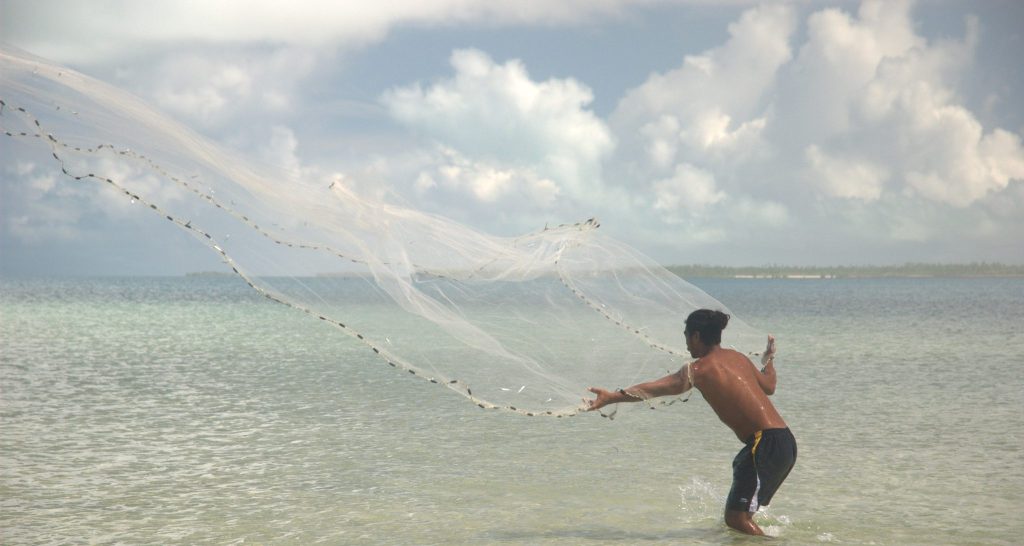When Good Samaritan Sister Taabeia Ibouri was living in Australia she got to know some seasonal workers from her home country of Kiribati and learnt of the challenges they faced. Now, having returned to Kiribati, she is helping prepare seasonal workers for their new life before they leave home.
Taabeia is working with Australian Catholic Religious Against Trafficking in Humans (ACRATH) as a forced labour prevention worker. She was also collaborating with the Australian High Commission in Kiribati to help smooth the way for workers headed for Australia.
“It all started when I helped some seasonal workers in Port Augusta,” she said. “From there, I became aware of the situation, and I wanted to help prepare them before they leave for work.
“As an I-Kiribati who lived in Australia for nearly four years, I knew the challenges of living in the culture and understanding of language and requirements and expectations.
“I think I can contribute and assist seasonal workers preparing to go to Australia.”
In a recent online presentation for ACRATH’s Hearts Stirred to Action gathering, Taabeia said many of the challenges the workers face are practical things about life in Australia.

Sr Taabeia Ibouri SGS. Image: Good Samaritan Education.
The first advice she gives them is to find out the contact details for social welfare services in the area where they will be working. This contact is important if something goes wrong with their seasonal work arrangements.
“I explain to them the broad role of social welfare, which includes introducing them to the local community and local church. If there are other concerns, they might contact social welfare services for help,” she said.
Other differences they need to be aware of include the fact that a driving licence is mandatory in Australia and people must not drive without one.
Fishing, which is a national pastime and a form of income and survival for many in Kiribati, can also only be done in Australia with a licence.
“My cousin phoned me from Australia to tell me he was in trouble because he and a group of friends, living near the sea, fished for oysters in NSW and an official told him he needed a licence before fishing again,” she said. It is something people from Kiribati would find strange.
Even the need to check the weather conditions every day is a new concept for people who have always lived in Kiribati.
“In Kiribati it is always the same, always hot each day. But in Australia you can have four seasons in one day. I tell them it can get very cold in Australia and they need a jacket,” she said.
Taabeia said the main thing driving people from Kiribati to seek work in Australia was the lack of jobs at home.
“Kiribati has a higher percentage of people who are unable to get a job and earn good money,” she said.
“Another reason they want to go to Australia is simply to have the experience of being and working in another country, to learn new things.”
Taabeia’s work with the Australian High Commission in Kiribati was sparked by a conversation with the Deputy High Commissioner and his colleagues, where she relayed stories of seasonal workers and some of the challenges they faced.
Taabeia also met with members of the High Commission’s team last year to share some thoughts on the Pre-Departure Handbook the workers are given.
“I suggested that having the manual in English significantly reduces the amount of information that is absorbed and we discussed the possibility of the pre-departure team translating the manual into te-Kiribati. These ideas are supported by the Deputy High Commissioner and his colleagues,” she said.

ACRATH’s Christine Carolan. Image: ACRATH.
Christine Carolan, National Executive Officer for ACRATH, said Taabeia’s contribution to ACRATH’s work supporting seasonal workers in Australia was important.
“Taabeia is part of our team which is working on ensuring that there is as little vulnerability as possible among the seasonal workers coming from the Pacific and Timor-Leste,” she said. “Her first-hand knowledge of some of the challenges these workers face on a daily basis is invaluable.”
Christine said ACRATH was working with the Australian Catholic Migrant and Refugee Office (ACMRO) on a joint project to encourage Catholic parishes and agencies across Australia to welcome seasonal workers.
“It’s such a simple concept, but until Taabeia, we didn’t have a worker to make it happen,” she said.
“Now, representatives from ACRATH and ACMRO are meeting four times a year with an expanding number of parishes and Catholic agencies to discuss how local communities can help welcome seasonal workers.”
Taabeia said parishes and local faith communities were discovering that simple acts of hospitality could go a long way for Pacific workers who are far from home and family.
“They love their families. When they are leaving Kiribati, they are very excited but in a short time they face the reality that they are far away from their family. They need a lot of support in terms of engagement,” Taabeia said.
“They love to sing and would love to participate in church singing or prayer. Or maybe they could be invited for cultural entertaining – singing and dancing.”

An artisanal net fisherman in a Kiribati lagoon. Image: AusAID/CC- BY-2.0
Christine said one example of the role parishes could play came to light in Warrnambool, Victoria, where 43 Timorese workers were employed in the local abattoir but feeling quite socially isolated.
“They received an invitation to the local Catholic parish for Mass on Sunday and when it was discovered that they loved to sing, they were invited to form a choir,” she said.
“So, it’s a great outcome, because they love singing and being a part of the parish community and this country parish has 43 young people who are excited to form a choir.
“It’s really community-building and it goes both ways, being a positive thing for both seasonal workers and the local communities they are part of.”
Christine said there had been “some significant improvements” in the Australian Government’s Pacific Australia Labour Mobility (PALM) scheme, under which more than 35,000 Pacific seasonal workers are working in Australia, with the current Minister Tony Burke “much more focused on worker well-being than was previously the case”.
The Government has announced plans to expand the PALM scheme, merging the former Pacific Labour Scheme and Seasonal Worker Program. Workers on placements of one to four years, will soon also be able to bring their families, although Christine said questions remain over appropriate accommodation, schooling, and health care.
Christine said ACRATH will head to Canberra in August to continue its advocacy for seasonal workers.
“We are very keen for Taabeia to be with us when we go to Canberra, where she can share her insights and experience with government ministers and officials,” Christine said.
“Taabeia has such a cultural intelligence about her work that her presence in Canberra will be really valuable.”
